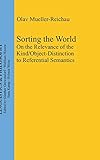Sorting the World : On the Relevance of the Kind/Object-Distinction to Referential Semantics / Olav Mueller-Reichau.
Material type: TextSeries: Linguistics & Philosophy ; 4Publisher: Berlin ; Boston : De Gruyter, [2013]Copyright date: ©2011Description: 1 online resource (165 p.)Content type:
TextSeries: Linguistics & Philosophy ; 4Publisher: Berlin ; Boston : De Gruyter, [2013]Copyright date: ©2011Description: 1 online resource (165 p.)Content type: - 9783110323030
- 9783110323580
- B840
- online - DeGruyter
- Issued also in print.
| Item type | Current library | Call number | URL | Status | Notes | Barcode | |
|---|---|---|---|---|---|---|---|
 eBook
eBook
|
Biblioteca "Angelicum" Pont. Univ. S.Tommaso d'Aquino Nuvola online | online - DeGruyter (Browse shelf(Opens below)) | Online access | Not for loan (Accesso limitato) | Accesso per gli utenti autorizzati / Access for authorized users | (dgr)9783110323580 |
Browsing Biblioteca "Angelicum" Pont. Univ. S.Tommaso d'Aquino shelves, Shelving location: Nuvola online Close shelf browser (Hides shelf browser)
Frontmatter -- Contents -- Chapter 1: Genericity – the standard view -- Chapter 2: Kinds as sortal concepts – from a cognitive perspective -- Chapter 3: Kinds as ontological primitives – from a semantic perspective -- Chapter 4: Spatiotemporal localisation – type-token theories of genericity -- Chapter 5: Indefinite reference to kinds – the pumpkin crusher puzzle -- Chapter 6: Lexical classes of predicates – normal and Carlsonian kind-level predicates -- Chapter 7 Overt and covert articles – a kind-based DRT approach to the semantics of noun phrases -- References
restricted access online access with authorization star
http://purl.org/coar/access_right/c_16ec
The basic hypothesis of this book is that linguistic reference to kinds should be seen as reference to sortal concepts, i.e. cognitive categories for identifying and classifying objects. Viewed that way, kinds serve as the interface between the conceptual system and the grammatical system. Kind-level predicates differ as to whether they presuppose (e.g. to be extinct) or entail (e.g. to invent) the existence of objects, with crucial consequences for the interpretation of indefinite argument noun phrases. Moreover, object reference always involves underlying kind reference, but kind reference does not always involve object reference. This asymmetry, once recognized, proves useful in solving otherwise puzzling problems in semantic composition.
Issued also in print.
Mode of access: Internet via World Wide Web.
In English.
Description based on online resource; title from PDF title page (publisher's Web site, viewed 28. Feb 2023)









